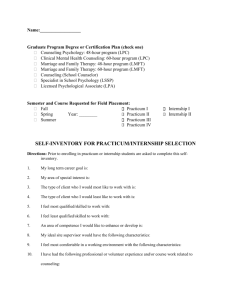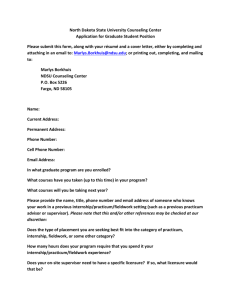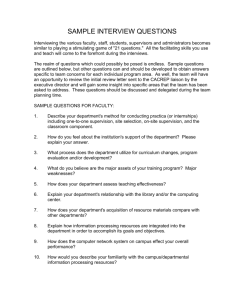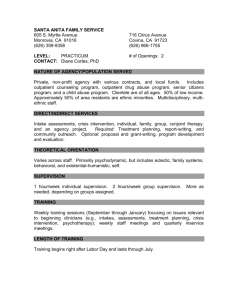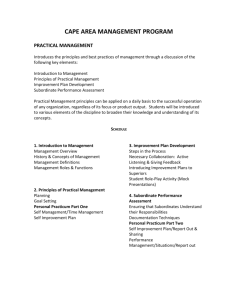University of North Texas at Dallas
advertisement
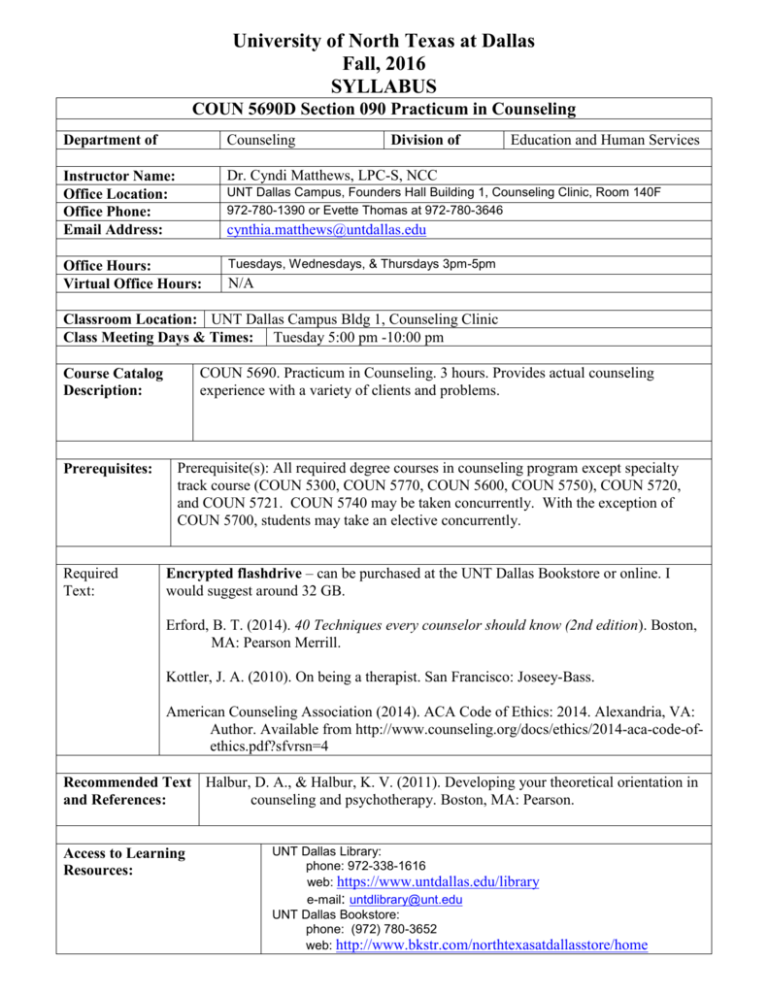
University of North Texas at Dallas Fall, 2016 SYLLABUS COUN 5690D Section 090 Practicum in Counseling Department of Counseling Instructor Name: Office Location: Office Phone: Email Address: Dr. Cyndi Matthews, LPC-S, NCC Office Hours: Virtual Office Hours: Tuesdays, Wednesdays, & Thursdays 3pm-5pm Division of Education and Human Services UNT Dallas Campus, Founders Hall Building 1, Counseling Clinic, Room 140F 972-780-1390 or Evette Thomas at 972-780-3646 cynthia.matthews@untdallas.edu N/A Classroom Location: UNT Dallas Campus Bldg 1, Counseling Clinic Class Meeting Days & Times: Tuesday 5:00 pm -10:00 pm COUN 5690. Practicum in Counseling. 3 hours. Provides actual counseling experience with a variety of clients and problems. Course Catalog Description: Prerequisites: Required Text: Prerequisite(s): All required degree courses in counseling program except specialty track course (COUN 5300, COUN 5770, COUN 5600, COUN 5750), COUN 5720, and COUN 5721. COUN 5740 may be taken concurrently. With the exception of COUN 5700, students may take an elective concurrently. Encrypted flashdrive – can be purchased at the UNT Dallas Bookstore or online. I would suggest around 32 GB. Erford, B. T. (2014). 40 Techniques every counselor should know (2nd edition). Boston, MA: Pearson Merrill. Kottler, J. A. (2010). On being a therapist. San Francisco: Joseey-Bass. American Counseling Association (2014). ACA Code of Ethics: 2014. Alexandria, VA: Author. Available from http://www.counseling.org/docs/ethics/2014-aca-code-ofethics.pdf?sfvrsn=4 Recommended Text Halbur, D. A., & Halbur, K. V. (2011). Developing your theoretical orientation in counseling and psychotherapy. Boston, MA: Pearson. and References: Access to Learning Resources: UNT Dallas Library: phone: 972-338-1616 web: https://www.untdallas.edu/library e-mail: untdlibrary@unt.edu UNT Dallas Bookstore: phone: (972) 780-3652 web: http://www.bkstr.com/northtexasatdallasstore/home e-mail: 1012mgr@fheg.follett.com Course Goals or Overview: This course is designed to provide students with a supervised counseling experience that will facilitate the student’s development as a professional counselor. The focus is on a consistent implementation of an internally consistent, personal theory of counseling with a variety of clients. Students are required to carry a specified caseload at Counseling Program clinical facilities. Students must complete supervised practicum experiences that total a minimum of 100 clock hours. Each student’s practicum includes all of the following (CACREP STANDARDS): 1. At least 40 clock hours of direct service with actual clients that contributes to the development of counseling skills. 2. Weekly interaction that averages one hour per week of individual and/or triadic supervision throughout the practicum by a program faculty member in accordance with the supervision contract. Biweekly communication (every other week) regarding the student’s progress between the program faculty and student’s supervisor must occur throughout the student’s practicum experience. 3. An average of 1 1/2 hours per week of group supervision that is provided on a regular schedule throughout the practicum by a program faculty member. 4. The development of video recordings for use in supervision or live supervision of the student’s interactions with clients. 5. Evaluation of the student’s counseling performance throughout the practicum, including documentation of a formal evaluation after the student completes the practicum. Learning Objectives/Outcomes: The student will demonstrate knowledge, skills, and practices necessary for success as a professional counselor via his or her participation in key assessments in this course. Student Learning Outcomes for this course are as follows: CMHC Knowledge and Skills Outcomes 1. Demonstrate the ability to apply and adhere to ethical and legal standards in CMHC. CACREP CMHC B1 2. Use the principles and practices of diagnosis, treatment, referral, and prevention of mental and emotional disorders to initiate, maintain, and terminate counseling. 3. Apply multicultural competencies to clinical mental health counseling involving case conceptualization, diagnosis, treatment, referral, and prevention of mental and emotional disorders. 4. Demonstrates appropriate use of culturally responsive individual, couple, family, group, and systems modalities for initiating, maintaining, and terminating counseling. 5. Demonstrates the ability to use procedures for assessing and managing suicide risk. 6. Applies current record-keeping standards related to clinical mental health counseling. 7. Provides appropriate counseling strategies when working with clients with addiction and co-occurring disorders. 8. Demonstrates the ability to recognize his or her own limitations as a clinical mental health counselor and to seek supervision or refer clients when appropriate. CMHC D1 Evaluation Professional Counseling Performance Evaluation (PCPE)-Practicum PCPE- Practicum CMHC D2 PCPE- Practicum CMHC D5 PCPE- Practicum CMHC D6 PCPE- Practicum CMHC D7 PCPE- Practicum CMHC D8 PCPE- Practicum CMHC D9 PCPE- Practicum 9. Maintains information regarding community resources to make appropriate referrals 10. Advocates for policies, programs, and services that are equitable and responsive to the unique needs of clients 11. Demonstrates the ability to modify counseling systems, theories, techniques, and interventions to make them culturally appropriate for diverse populations. 12. Selects appropriate comprehensive assessment interventions to assist in diagnosis and treatment planning, with an awareness of cultural bias in the implementation and interpretation of assessment protocols 13. Demonstrates skill in conducting an intake interview, a mental status evaluation, a biopsychosocial history, a mental health history, and a psychological assessment for treatment planning and caseload management. 14. Screens for addiction, aggression, and danger to self and/or others, as well as co-occurring mental disorders. 15. Applies the assessment of a client's stage of dependence, change, or recovery to determine the appropriate treatment modality and placement criteria within the continuum of care. 16. Demonstrates appropriate use of diagnostic tools, including the current edition of the DSM, to describe the symptoms and clinical presentation of clients with mental and emotional impairments. 17. Is able to conceptualize an accurate multi-axial diagnosis of disorders presented by a client and discuss the differential diagnosis with collaborating professionals. 18. Differentiates between diagnosis and developmentally appropriate reactions during crises, disasters, and other trauma-causing events. SC Knowledge and Skills Outcomes 1. Demonstrates the ability to apply and adhere to ethical and legal standards in school counseling. 2. Demonstrates self-awareness, sensitivity to others, and the skills needed to relate to diverse individuals, groups, and classrooms. 3. Designs and implements prevention and intervention plans related to the effects of (a) atypical growth and development, (b) health and wellness, (c) language, (d) ability level, (e) multicultural issues, and (f) factors of resiliency on student learning and development. 4. Demonstrates the ability to use procedures for assessing and managing suicide risk. 5. Demonstrates the ability to recognize his or her limitations as a school counselor and to seek supervision or refer clients when appropriate. 6. Demonstrates multicultural competencies in relation to diversity, equity, and opportunity in student learning and development. 7. Assesses and interprets students' strengths and needs, recognizing uniqueness in cultures, languages, values, CMHC F1 PCPE- Practicum CMHC F2 PCPE- Practicum CMHC F3 PCPE- Practicum CMHC H1 PCPE- Practicum CMHC H2 PCPE- Practicum CMHC H3 PCPE- Practicum CMHC H4 PCPE- Practicum CMHC L1 PCPE- Practicum CMHC L2 PCPE- Practicum CMHC L3 PCPE- Practicum CACREP SC B1 Evaluation PCPE- Practicum SC D1 PCPE- Practicum SC D3 PCPE- Practicum SC D4 PCPE- Practicum SC D5 PCPE- Practicum SC F1 PCPE- Practicum SC H1 PCPE- Practicum backgrounds, and abilities. 8. Selects appropriate assessment strategies that can be used to evaluate a student's academic, career, and personal/social development. 9. Analyzes assessment information in a manner that produces valid inferences when evaluating the needs of individual students and assessing the effectiveness of educational programs. 10. Makes appropriate referrals to school and/or community resources. 11. Assesses barriers that impede students' academic, career, and personal/social development. 12. Applies relevant research findings to inform the practice of school counseling. 13. Develops measurable outcomes for school counseling programs, activities, interventions, and experiences. SACC Knowledge and Skills Outcomes 1. Demonstrates the ability to apply and adhere to ethical and legal standards in student affairs and college counseling 2. Demonstrates the ability to recognize his or her own limitations as a college counselor and/or student affairs 3. Applies multicultural competencies to the practice of student affairs and college counseling. 4. Demonstrates the ability to use procedures for assessing and managing suicide risk. 5. Demonstrates a general understanding of principles and models of biopsychosocial assessment and case conceptualization that lead to appropriate counseling for students in postsecondary education. 6. Applies multicultural competencies to serve diverse postsecondary student populations. 7. Addresses multicultural counseling issues as they relate to student development and progress in postsecondary education (e.g., discrimination, power, privilege, oppression, values). 8. Assesses and interprets postsecondary student needs, recognizing uniqueness in culture, languages, values, backgrounds, and abilities. 9. Applies relevant research findings to inform the practice of student affairs and college counseling. 10. Develops measurable outcomes for college counseling and student development activities. SC H2 PCPE- Practicum SC H3 PCPE- Practicum SC H4 PCPE- Practicum SC H5 PCPE- Practicum SC J1 PCPE- Practicum SC J2 PCPE- Practicum CACREP SACC B1 Evaluation PCPE-Practicum SACC C5 PCPE- Practicum SACC D1 PCPE- Practicum SACC D4 PCPE- Practicum SACC D5 PCPE- Practicum SACC F4 PCPE- Practicum SACC F5 PCPE- Practicum SACC H1 PCPE- Practicum SACC J1 PCPE- Practicum SACC J2 PCPE- Practicum Course Outline This schedule is merely a suggestion of topics to be covered and may deviate from the below schedule. The schedule subject to change by the instructor. Any changes to this schedule will be communicated by the instructor in class. TOPICS & READING TIMELINE, Week of DUE 1. Orientation to Clinic 8/25/2015 *Handbook of Clinic Procedures *Proof of Liability Due with copy of *Assessment & Scoring Insurance *Initial Paperwork *Statement of Ethical/Legal *Putting together the files Awareness Due *Chapter 1 Developing Your Theoretical Orientation *Professional Disclosure Statement due *Quiz Clinic Handbook (Must score 80% or higher to see clients) 2. Group Clinical Supervision *Intake Assessment *Suicide Assessment *Self Care (Relaxation Breathing & Assessment) *Start Scheduling Clients *Chapter 2 Developing Your Theoretical Orientation 9/1/2015 3. Group Clinical Supervision *Start Seeing Clients *SOAP notes *Suicide Assessment Practice *Self Care *Chapter 3 Developing Your Theoretical Orientation *Chapter 4 Developing Your Theoretical Orientation (just your top 2 theories) 9/8/2015 *Selective Theory Sorter Due – copy for class (p. 27-31 Developing Your Theoretical Orientation) 4. Group Clinical Supervision *Self Care *Chapter 1 On Being a Therapist: Therapist’s Journey *Section 5, Chapter 17-20: 40 Techniques Every Counselor Should Know *Person Centered, Humanistic *Feeling Words *Reflecting/Restating 9/15/2015 First Mini Case Conceptualization (3) 5. Group Clinical Supervision *Chapter 2 On Being a Therapist: Struggle for Power *Section 6, Chapter 21-29: 40 Techniques Every Counselor Should Know *CBT *12 Irrational Beliefs, Thought Patterns, ABC *Self Care *Ethics in Counseling 9/22/2015 First Mini Case Conceptualization (3) 6. Group Clinical Supervision *Chapter 3 On Being a Therapist: Personal/Professional Life *Section 4 & 7, 14-16, Chapter 30-32: 40 Techniques Every Counselor Should Know *Reality Therapy (WDEP) * (Behavioral) Relaxation Techniques (Progressive Muscle Relaxation, Guided Imagery) *Sleep Handouts – helping clients with sleep issues 9/29/2015 First Mini Case Conceptualization (3) Guest Speaker: Getting an Internship 7. Group Clinical Supervision *Chapter 4 On Being a Therapist: Clients Change Therapists *Working with Anger/Domestic Violence Cycle *Bill of Rights/Assertiveness 10/6/2015 Second Mini Case Conceptualization (3) 8. Mid-Term Evaluations *Chapter 5 On Being a Therapist: Hardships of Practice *Section 3, Chapter 11-12: 40 Techniques Every Counselor Should Know *Introduction to Sand tray *Gestalt Techniques 10/13/2015 Second Mini Case Conceptualization (3) PCPE due - meet during supervision 9. Group Clinical Supervision *Chapter 6 On Being a Therapist: Being Imperfect/Failure *Section 2, Chapter 6-10: 40 Techniques Every Counselor Should Know *Case Conceptualization – Student *Adlerian: Family of origin questions 10/20/2015 Second Mini Case Conceptualization (3) Midterm Note Check 10. Group Clinical Supervision *Chapter 7 On Being a Therapist: Patients/Patience *Case Conceptualization – Student *Psychoanalytic/Transactional Analysis – Parent/Adult/Child 10/27/2015 Third Mini Case Conceptualization 11. Group Clinical Supervision *Chapter 8 On Being a Therapist: Boredom & Burnout *Section 1, Chapter 1-5: 40 Techniques Every Counselor Should Know *Solution Focused Counseling *Case Conceptualization – Student 11/3/2015 Third Mini Case Conceptualization 12. Group Clinical Supervision *Chapter 9 On Being a Therapist: That which is not said * Case Conceptualization – Student *Topic decided by student goals from Midterm 11/10/2015 Third Mini Case Conceptualization 13. Group Clinical Supervision *Chapter 10 On Being a Therapist: Lies we tell ourselves *Case Conceptualization – Student *Topic decided by student goals from Midterm 11/17/2015 Final Case Conceptualization (3) 14. Group Clinical Supervision *Chapter 11 On Being a Therapist: Alternative Therapy 11/24/2015 Final Case Conceptualization (3) *Case Conceptualization – Student *Topic: Termination Sessions 15. Group Clinical Supervision *Chapter 12 On Being a Therapist: Creativity/Pers. Growth *Case Conceptualization – Student 11/31/2015 Final Case Conceptualization (2) 16. Group Clinical Supervision *End of Semester Wrap-up 12/7/2015 17. Final Evaluations *Final Notes 12/14/2015 PCPE due – meet during supervision Final Note Check No More Clients seen after 12/9/2015 Course Evaluation Methods Methods of instruction: Instructional methods may include assigned readings, role plays, group discussion, didactic lectures, journal exploration, individual/triadic and group supervision, case conceptualizations and related presentations, video/film analysis, and experiential activities. Student performance evaluation criteria and procedures: KEY ASSESSMENT: PCPE-Practicum Midterm KEY ASSESSMENT: PCPE-Practicum Final Instrument Value (points or percentages) Assigned Readings/Resources and Group Participation Practicum Handbook Quiz Professional Counseling Performance Evaluations [PCPE]-Practicum Midterm and Final 3 Mini Case Conceptualizations – in session if no time during class Review of Client Files (triadic supervisor will review files at mid-point and end of semester) Formal Case Presentations Professional Responsibility Total: 160 20 50 (25 each) 30 (10 each) 20 (10 each) 20 A. FORMAL CASE PRESENTATION (20PTS) The purposes of your case presentation (one before final) is to expose students to a wider variety of clients, client issues, and work in different settings and provide opportunities or interactive group feedback and learning. For this project, select a client with whom you are having some difficulty and would like additional feedback. Create a Powerpoint and distribute a copy to each class member and the professor (bring 4 copies) before you begin your presentation. Your Powerpoint should include a basic overview from the bulleted points below. Presentation: 1. Outline for Oral Presentation a. Provide a BRIEF 5 Minute (or less) introduction of the client & the supervision sought via Powerpoint. b. Show a 10-15 minute clip of your counseling session with a client (please refrain from adding commentary during the demonstration unless your professor or classmate asks a clarifying question). Be advised that you should ensure your video tape is working properly on the equipment in class before your presentation begins. c. 10 Minutes of Supervision/Q&A will follow (practice active listening non-defensively as you receive both encouraging and possibly constructive feedback from your classmates and professor) 2. Client information / Brief Biopsychosocial History d. Description of the client (age, race, gender) e. Statement of the client’s problem f. Family, home, cultural background g. Relationship status and relationship/sexual history h. Physical health history i. Educational history j. Occupational history k. Social interactions, hobbies, recreational activities, and spiritual involvement 3. Counseling history a. Previous counseling or evidence of concerns b. Precipitants to intake c. Summary of work thus far (number of sessions with you, content) 4. 5. Current conceptualization a. Assessment (mental status observations, self-report, instrument results, client strengths, client needs) b. Diagnostic impressions in DSM-V format c. Brief case conceptualization (what do you think is going on? what would your theory say is the issue? Role of social/cultural issues?) d. Treatment plan (client’s goals, your goals, and approaches used thus far) e. Theory-based plans for future sessions Solicit feedback regarding counselor’s performance a. Statement of difficulties/questions b. Introduction of the tape and description what you are attempting to accomplish c. Specific request for the type of feedback or help you would like A. Review of Client Files (2 x 10pts = 20 pts) Students’ triadic supervisor will review client files intermittently and provide a grade at the midpoint and end of the semester to ensure notes are done adequately and client’s files have all the pertinent information according to Clinic procedures. B. PCPE (Mid Term and Final) (2x 25pts = 50pts) Student will complete PCPE at mid-term and final according to course agenda. The professor and triadic supervisor will then evaluate the PCPE and provide an additional PCPE for the student during a 20 minute in person conference on the day (at mid-term and at final) indicated on the course agenda. D. Mini Case Studies (3 x 10 pts = 30 pts) Choose 3 different supervision sessions where you will present your mini case study Write up: 1. Client information / Brief Biopsychosocial History a. Description of the client (age, race, gender) b. Statement of the client’s problem c. Family, home, cultural background d. Relationship status and relationship/sexual history e. f. g. h. 2. Physical health history Educational history Occupational history Social interactions, hobbies, recreational activities, and spiritual involvement Counseling history a. Previous counseling or evidence of concerns b. Precipitants to intake c. Summary of work thus far (number of sessions with you, content) 3. Current conceptualization a. Assessment (mental status observations, self-report, instrument results, client strengths, client needs) b. Diagnostic impressions in DSM-IV-TR format c. Brief case conceptualization (what do you think is going on? what would your theory say is the issue? Role of social/cultural issues?) d. Treatment plan (client’s goals, your goals, and approaches used thus far) e. Theory-based plans for future sessions 4. Show video tape of at least 10 minutes during supervision University Policies and Procedures Students with Disabilities (ADA Compliance): The University of North Texas Dallas faculty is committed to complying with the Americans with Disabilities Act (ADA). Students' with documented disabilities are responsible for informing faculty of their needs for reasonable accommodations and providing written authorized documentation. For more information, you may visit the Office of Disability Accommodation/Student Development Office, Suite 115 or call Laura Smith at 972-780-3632. Student Evaluation of Teaching Effectiveness Policy: The Student Evaluation of Teaching Effectiveness (SETE) is a requirement for all organized classes at UNT. This short survey will be made available to you at the end of the semester, providing you a chance to comment on how this class is taught. I am very interested in the feedback I get from students, as I work to continually improve my teaching. I consider the SETE to be an important part of your participation in this class. Assignment Policy: Assignments are expected to submitted on the due date designated in the syllabus. Assignments that are not submitted by the end of the day on which they are due will receive an automatic deduction of 5pts. Assignments will receive a deduction of 5 pts/day they are late. Assignments that are more than 3 days late will not be accepted, and the student will be assigned a 0 for the assignment. Exam Policy: Exams should be taken as scheduled. No makeup examinations will be allowed except for documented emergencies (See Student Handbook). Academic Integrity: Academic integrity is a hallmark of higher education. You are expected to abide by the University’s code of conduct and Academic Dishonesty policy. Any person suspected of academic dishonesty (i.e., cheating or plagiarism) will be handled in accordance with the University’s policies and procedures. Refer to the Student Code of Conduct at http://www.unt.edu/csrr/student_conduct/index.html for complete provisions of this code. Bad Weather Policy: On those days that present severe weather and driving conditions, a decision may be made to close the campus. In case of inclement weather, call UNT Dallas Campuses main voicemail number (972) 7803600 or search postings on the campus website www.unt.edu/dallas. Students are encouraged to update their Eagle Alert contact information, so they will receive this information automatically. Attendance and Participation Policy: The University attendance policy is in effect for this course. Class attendance and participation is expected because the class is designed as a shared learning experience and because essential information not in the textbook will be discussed in class. Students who miss any periods of class will have points deducted from their final grade, unless it is a medical emergency or death of immediate family member. Written documentation is required to substantiate any emergency absence in which the student asked to be excused. Attendance is defined as both physical and intellectual presence. Therefore, students who are not fully present during class will be asked to leave and assigned an absence for the day. The dynamic and intensive nature of this course makes it impossible for students to make-up or to receive credit for missed classes. Attendance and participation in all class meetings is essential to the integration of course material and your ability to demonstrate proficiency. Students are responsible to notify the instructor if they are missing class and for what reason. Students are also responsible to make up any work covered in class by contacting a classmate. It is not the professor’s responsibility to update the student on missed information. It is recommended that each student coordinate with a student colleague to obtain a copy of the class notes, if they are absent. Diversity/Tolerance Policy: Students are encouraged to contribute their perspectives and insights to class discussions. However, offensive & inappropriate language (swearing) and remarks offensive to others of particular nationalities, ethnic groups, sexual preferences, religious groups, genders, or other ascribed statuses will not be tolerated. Disruptions which violate the Code of Student Conduct will be referred to the Center for Student Rights and Responsibilities as the instructor deems appropriate. Additional Policies: - Use of Cell Phones & other Electronic Devices in the Classroom Due to the experiential nature of this class and the importance of the information being conveyed during lecture, electronic devices, except for laptops, are not to be used during class time. Cell phones must be set to vibrate or silent during class, and for no reason may a student make or receive a call during class, except for medical emergencies. In addition, texting is not allowed during class time. Students must set their texting device (cell phone, smart phone, etc…) to silent. Students who engage in texting or phone calls during class will be asked to leave. - Food & Drink in the Classroom Due to the length and time during which class has been scheduled food and drink are allowed in the classroom. However, it is the responsibility of the student to bring food which does not result in distraction from participation in class activities. Students are responsible for cleaning any trash which results from their food items and cleaning any spills/messes. - Grade of Incomplete, “I” For this course the grade of "I" is, as a general rule, not given. If a student believes that they posses extenuating circumstances which bear the instructors consideration, a conference with the instructor should be scheduled. UNT Dallas Department of Counseling and Human Services Class Attendance and Participation Rubric In an effort to cultivate an effective learning environment, faculty members request that each student meets expectation of the following behaviors. The intent of this rubric is NOT to be punitive but rather to have clear and consistent expectations across the department. Students have the freedom to choose their behavior. Faculty will enforce the following guidelines for the behaviors that students choose. Meets Expectation Occasionally Below Consistently Below -0% of grade Expectation -2.5% of Expectation -5% of final final grade grade (-2.5% for each additional missed class tardy) Attends all class with Misses one class with Misses two or more classes 1. Attendance one or less excused excused absence and due to non-emergency absence. one absence due to (family member death, emergency (family hospitalization, or something member death, involving police or hospitalization, or firefighters).* something involving police or firefighters). Arrives and is ready Is more than 5-10 Is more than 10 minutes tardy 2. Punctual to begin on time with minutes tardy two more than two times or no more than one times or leaves class leaves class early more than tardy and remains to early two times. two times.* the end of class. Questions and Questions and Questions and comments are 3. Quality comments are on comments are often tangential (3+ times), Contribution topic, indicate reflection occasionally (2 times) do not indicate knowledge of and knowledge of tangential, do not readings, and do not readings, and contribute indicate knowledge of contribute to a deeper to a deeper readings, and do not understanding. understanding. contribute to a deeper understanding. Pays attention and Does not pay attention Does not pay attention but 4. Attentive does not engage in but rather engages in rather engages in side Behavior side conversations or side conversations or conversations or off-task off-task technology off-task technology technology (i.e. texting, activity (i.e. texting, (i.e. texting, surfing surfing web, social surfing web, social web, social networking) more than twice networking) more networking) twice a a semester. than once a semester. semester. Is consistently Is uninformed about Is uninformed about 5. Responsible informed by checking instructions and instructions and updates more Behavior Blackboard, syllabus, updates twice. than twice. and emails for instructions and updates. * Results in drop in the final letter grade in class. If two or more, then drops another letter grade.

